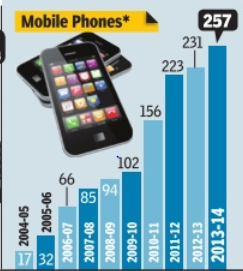Cell/ Mobile phones: India
m (Pdewan moved page Cell phones: India to Cell/ Mobile phones: India) |
(→Subscriber growth) |
||
| Line 15: | Line 15: | ||
= Subscriber growth= | = Subscriber growth= | ||
| + | [[File: Mobile telephones.png|Sales of Mobile telephones/ cellular telephones in India, 2004-14 Source: [http://epaperbeta.timesofindia.com//Gallery.aspx?id=11_07_2014_008_003_002&type=P&artUrl=WHAT-IT-MEANS-FOR-YOUR-QUALITY-OF-LIFE-11072014008003&eid=31808 '' The Times of India '' ]|frame|500px]] | ||
''' Chennai second among metros in mobile subscriber growth ''' | ''' Chennai second among metros in mobile subscriber growth ''' | ||
Revision as of 21:07, 5 August 2014
This is a collection of articles archived for the excellence of their content. Readers will be able to edit existing articles and post new articles directly |
Cell phones: India
Subscriber growth

Chennai second among metros in mobile subscriber growth
Ishan Srivastava, TNN | Aug 27, 2013 The Times of India
CHENNAI added 82,296 mobile subscribers in July 2013, the second highest among four metros, according to the latest data released by Telecom Regulatory Authority of India (Trai). With this addition, total number of subscribers in Chennai has reached 1.15 crore. As per the 2011 census, Chennai has a population of 46 lakh.
Chennai's growth is second only to Delhi in that month, which added four lakh users on a subscriber base of 2.8 crore. Mumbai follows Chennai with 81,738 additions and Kolkata added 39,946 to its subscriber base.
Teledensity -- the number of mobile connections relative to population --crossed the 100% mark for the metros in 2009, implying that there were more mobile connections in these cities than the number of residents. The current teledensity in Chennai is nearly 200% or two mobile connections for every person, but the growth shows no signs of slowing down with constant monthly additions. For example, Chennai added 83,290 users in June and 70,444 in May.
Multi-SIM usage, increased migrant population and data consumption are seen as the main reasons driving growth. "A lot of these additions are 'passive' SIMs that people keep just to avail of offers or to enjoy better rates on particular routes and are not in regular use," said Sandip Biswas, director at Deloitte, a consultancy firm. "Operators don't mind it either and are happy with any increase in numbers in such a highly competitive market."
Also, a lot of usage of new SIMs is driven by data consumption where people buy SIMs to access internet on their media devices such as tablets in addition to the one they use for voice, said Milan Sheth, partner at consultancy firm EY.
However, some experts said that subscriber numbers have become less relevant now and what matters is how much data is being consumed by people and how much money is realised by telecom companies through it. "Inactive connections can be as high as 20%-30 % of total ," said Prashant Singhal, partner at EY and who tracks telecom sector.